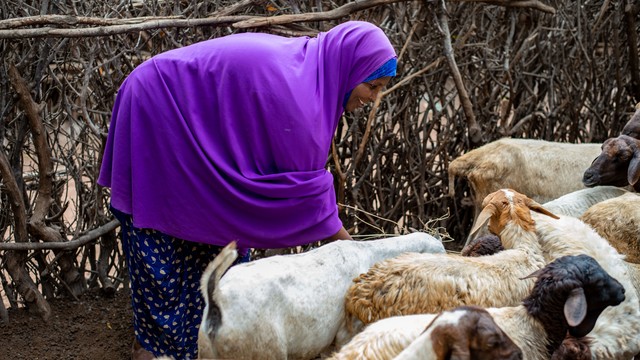IIED and partners call for cities to develop a proactive response to urban displacement
IIED and partners’ submission to UN High-Level Panel on Internal Displacement calls for a complete rethinking of how government and other actors respond to internal displacement in urban areas.

Displaced people from the Libyan town of Tawargha living at a military academy in the city of Tripoli (Photo: EU Civil Protection and Humanitarian Aid via Flickr, CC BY-ND 2.0)
IIED, JIPS and UN-Habitat have made a joint submission to the UN High-Level Panel on Internal Displacement, calling for a proactive urban response to the global challenge of displacement.
The organisations say their submission aims to provide actionable and forward-looking recommendations, and a fundamental re-evaluation of how governments (local and national), donors, and humanitarian and development agencies work together to address urban displacement.
It is estimated that 33.4 million people were internally displaced during 2019. Some 8.5 million people were displaced from their homes by violence and conflict, while 24.9 million people were displaced by disasters. The majority of displaced people relocate to urban areas – with profound impacts both on displaced persons and their host communities.
The coronavirus pandemic has only served to emphasise the critical importance of developing a more effective approach for supporting internally displaced people (IDPs) living in towns and cities around the world.
These people are frequently living hidden lives, unregistered with government or health authorities and dependent on informal networks for day-to-day support. As such they are hugely vulnerable to both the health and economic impacts of COVID-19.
In response to this global challenge, UN Secretary-General Antonio Guterres last year set up the High-Level Panel on Internal Displacement and asked it to find durable solutions. It is due to report back in 2021.
The eight-member panel has issued a public call for bold, creative and practical inputs to inform its work. IIED, UN-Habitat and the Joint IDP Profiling Service (JIPS) came together to make a submission that focuses particularly on the urban dimension of displacement and its implications for policy and practice.
This submission was jointly drafted by Dr Isis Nuñez Ferrera from JIPS, IIED principal researcher Lucy Earle, and Dyfed Aubrey and Stephanie Loose from UN-Habitat.
Earle said: “Our submission stands out because it is written by people with both humanitarian and urban development expertise.
“It’s rare for actors who understand how cities function to engage with those that plan and implement responses to displacement crises – but it’s absolutely critical if we are going to move beyond short-term emergency relief to find durable solutions for those displaced into urban areas.”
Key messages
The joint submission has four key messages, each underpinned by further recommendations. The four messages are:
- We must return the focus to the lived experiences of urban IDPs, providing an enabling urban environment for IDPs to flourish as citizens. This means identifying and removing the barriers that prevent them from benefiting and contributing to the social, political, economic and cultural life of towns and cities.
- We must support and work with local governments and city leaders to recognise IDPs as rights-holding urban citizens, build their capacity to listen and respond to IDP needs, and provide concrete incentives that leverage the benefits for IDPs, host communities and the city as a whole that can result from displacement
- We must work with urban systems and institutions so that cities function in support of a dignified life and solutions for the internally displaced. This will require integrating spatial and sectoral approaches, and positioning the constellation of actors that run towns and cities as responders to and managers of displacement
- We must take active steps to ensure complementarity between the actions of humanitarian and development actors, city authorities and services providers. This means setting collective outcomes, and aligning development agendas and associated resources in support of durable solutions and impacts at scale for IDPs.
Powerful arguments to the High-Level Panel from @iied, @JIPS_profiling and @UNHABITAT advocating for a re-evaluation of the way in which governments, donors, humanitarian and development actors work together to address urban displacement. https://t.co/7PiXPpI4UW
— Peter Oborn (@peteroborn) May 27, 2020
About the institutions
The three institutions are all members of the Global Alliance for Urban Crises a multi-disciplinary, collaborative community of practice working to prevent, prepare for and effectively respond to humanitarian crises in urban settings.
The Joint IDP Profiling Service (JIPS) is an inter-agency body providing support, evidence and analysis about displacement situations to inform joint interventions and responses.
UN-Habitat is the United Nations Human Settlements Programme. It promotes transformative change in cities and human settlements through knowledge, policy advice, technical assistance and collaborative action to leave no one and no place behind.
IIED's Human Settlements research group addresses urban environmental issues at all levels – with local grassroots partners, with colleagues in the international research community and globally, to influence the sustainable development agenda. IIED is currently leading a study comparing the experiences of refugees and IDPs in cities and camps in four countries – Afghanistan, Ethiopia, Jordan and Kenya.
- Download the submission in full: IDPs in towns and cities – working with the realities of internal displacement in an urban world (PDF)
Contact
Lucy Earle (lucy.earle@iied.org), principal researcher, IIED’s Human Settlements research group



